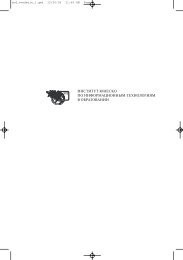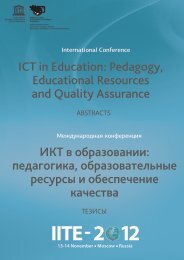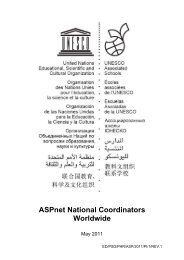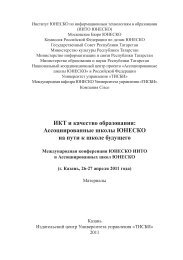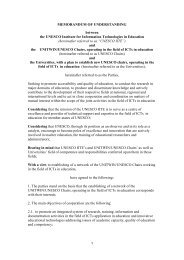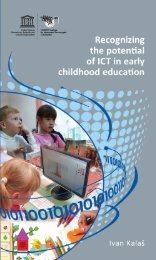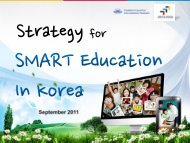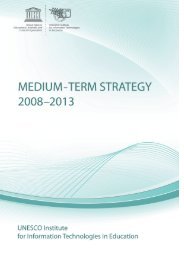UNESCO ICT Competency Framework for Teachers ... - unesco iite
UNESCO ICT Competency Framework for Teachers ... - unesco iite
UNESCO ICT Competency Framework for Teachers ... - unesco iite
Create successful ePaper yourself
Turn your PDF publications into a flip-book with our unique Google optimized e-Paper software.
APPENDIX 1: <strong>UNESCO</strong> <strong>ICT</strong> TEACHER COMPETENCY FRAMEWORK MODULES<br />
Knowledge Creation<br />
OBJECTIVES<br />
TEACHERS SHOULD BE ABLE TO<br />
KC.3.a. Explicitly model their own reasoning,<br />
problem solving and knowledge-creation<br />
while teaching students.<br />
KC.3.b. Design online materials and activities<br />
that engage students in collaborative<br />
problem-solving, research or creating art.<br />
KC.3.c. Help students design project<br />
plans and activities that engage them in<br />
collaborative problem-solving, research, or<br />
artistic creation.<br />
KC.3.d. Help students incorporate multimedia<br />
production, web production and<br />
publishing technologies into their projects in<br />
ways that support their ongoing knowledge<br />
production and communication with other<br />
audiences.<br />
KC.3.e. Help students refl ect on their own<br />
learning.<br />
KC.4.a. Describe the function and purpose<br />
of <strong>ICT</strong> production tools and resources<br />
(multimedia recording and production<br />
equipment, editing tools, publication<br />
software, web design tools) and use them to<br />
support students’ innovation and knowledge<br />
creation.<br />
EXAMPLE METHODS (FOR TEACHER EDUCATION OR<br />
PROFESSIONAL LEARNING)<br />
Have participants build on the discussion of their own cognitive<br />
skills to externalize and overtly demonstrate the use of these<br />
skills to solve problems in their subject area. Have participants<br />
share their strategies and processes <strong>for</strong> solving problems and<br />
creating new knowledge with peers.<br />
Discuss characteristics of online materials that support students<br />
in the design and planning of their own learning activities; have<br />
participants work in teams to generate and evaluate online<br />
materials. Have participants model online collaborative problemsolving,<br />
research, or art in a professional learning community.<br />
Discuss characteristics of teacher activities that support students<br />
in the design and planning of their own learning activities;<br />
have participants generate and demonstrate examples of such<br />
activities.<br />
Discuss characteristics of teacher activities that support students<br />
in the use of various production technologies in their own learning<br />
activities; have participants generate examples of such activities;<br />
have participants demonstrate examples of multimedia production,<br />
web production, and publishing technologies to support student<br />
publishing in online professional learning communities.<br />
Discuss characteristics of teacher activities that support<br />
students’ refl ective learning; have participants generate<br />
examples, share their refl ections, and critique other’s work in a<br />
professional learning community.<br />
Demonstrate a variety of software packages and digital<br />
production resources and describe how they support and advance<br />
students’ innovation and knowledge creation practices. Have<br />
participants analyze specifi c examples of use of these resources<br />
in their subject area and describe how they support student<br />
innovation and knowledge creation. Have participants use and<br />
evaluate these tools in a unit that they design.<br />
<strong>UNESCO</strong> <strong>ICT</strong> <strong>Competency</strong> <strong>Framework</strong> <strong>for</strong> <strong>Teachers</strong><br />
37



